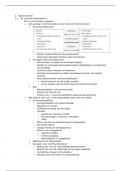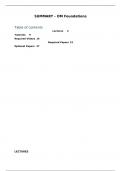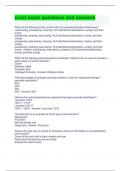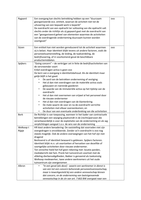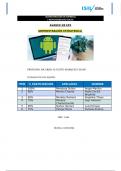APPROACHES IN
PSYCHOLOGY
, P - Research in modern psychology is scien c
E - Psychology has same aims as natural sciences - to describe, understand, predict and control behaviour
E - Furthermore, the learning (behaviourists and social learning theories) /cogni ve/biological approaches all
rely on the use of scien c methods (lab studies to inves gate theories in a controlled/unbiased way
ORIGINS OF PSYCHOL
L - Throughout the 20th century, psychology has established itself as a scien c discipline
EMPIRIC
THE EMERGENCE OF PSYCHOLOGY AS A SCIENCE knowled
sensory
1900’s: generally
Paradigm - set of shared assumptions and agreed methods Early behaviourists rejected introspec on scien c
within a scientific discipline - John B. Watson (1913) - introspec on is subjec ve as it varies from person to
person
- Scien c psychology should only surfy phenomena that can be observed and
Paradigm shift - results of scientific revolution: significant measured WILHELM WUNDT (1832-1920)
change in dominant unifying theory within a scientific 1930’s: “the father of psychology”
discipline Behaviourists scien c approach dominated psychology • 1879: Wundt opened 1st psyc
- B.F. skinner (1953) - brought language, method and rigour of the natural Germany
Objectivity - when all sources of personal bias are sciences into psychology • The human mind is construct
- The behaviourists focus on learning and the use of carefully controlled lab sensa on and percep on (str
minimised so as not to distort or influence the research experiments, would dominate psychology for the next few decades. • Aim - describe nature of hum
process 1950’s: through method of introspec
Cogni ve psychology used scien c procedures to study mental processes INTROSPECTION:
The empirical method - scientific approaches that are - Cogni ve revolu on - intellectual movement which aimed at applying the Comes from la n - means “look
based on gathering of evidence through direct observation scien c method to the study of mental processes in lab condi ons Ppts asked to re ect on own cog
- Although mental processes cannot be studied directly (as opposed to them
and experience
behaviour), it is possible to make inferences (deduc ons about way mental 1st systema c experimental a e
processes operate based on observed behaviour) breaking up conscious awarene
Replicability - extent to which scientific procedures and 1990’s: thoughts, images and sensa on
findings can be repeated by other researchers Biological approach introduced technological advances EXAMPLE:
- biological psychologists (bio-psychologists): took advantage of advances in - Ppts given s mulus such as a
Falsifiability - principle that theory cannot be considered technology to understand behaviour based on physiological processes re ect on the experience
- fMRI - Would then report what s m
scientific unless its admits the possibility of being proved - EEG - Standardised procedures: sa
untrue (false) - Advances in gene c research surroundings and instruc on
- Mind/consciousness = ac ves of the brain procedures can be replicated
P - However other aspects are considered unscien c today P - elements of introspec on are classe
E - Wundt relied on ppts self-repor ng their ‘private’ mental processes = such data is subjec ve + ppts may E - e.g Wundt recorded the introspec o
not have wanted to reveal some of the thoughts they were having environment
E - Also he relied on non-observable responses: cant directly observe memory, percep ons… E - He also standardised his procedures
L - This means because Wundt’s ndings may not be replicable by other researchers same info + were tested in same way
Contrasts with PAVLOV (behaviourism): achievable reproducible results, based on observable behaviour, L - therefore Wundt’s research lab be co
leading to principles that could be generalised to all human beings + its objec ve. the later scien c approaches in psycho
fl tifi
titifi ti titifi
fltiti tifiti tifititi titititt tifi
tititi fi ti titifi ti ti tifi
tifi
ti ti tifi ti ti ti ti
PSYCHOLOGY
, P - Research in modern psychology is scien c
E - Psychology has same aims as natural sciences - to describe, understand, predict and control behaviour
E - Furthermore, the learning (behaviourists and social learning theories) /cogni ve/biological approaches all
rely on the use of scien c methods (lab studies to inves gate theories in a controlled/unbiased way
ORIGINS OF PSYCHOL
L - Throughout the 20th century, psychology has established itself as a scien c discipline
EMPIRIC
THE EMERGENCE OF PSYCHOLOGY AS A SCIENCE knowled
sensory
1900’s: generally
Paradigm - set of shared assumptions and agreed methods Early behaviourists rejected introspec on scien c
within a scientific discipline - John B. Watson (1913) - introspec on is subjec ve as it varies from person to
person
- Scien c psychology should only surfy phenomena that can be observed and
Paradigm shift - results of scientific revolution: significant measured WILHELM WUNDT (1832-1920)
change in dominant unifying theory within a scientific 1930’s: “the father of psychology”
discipline Behaviourists scien c approach dominated psychology • 1879: Wundt opened 1st psyc
- B.F. skinner (1953) - brought language, method and rigour of the natural Germany
Objectivity - when all sources of personal bias are sciences into psychology • The human mind is construct
- The behaviourists focus on learning and the use of carefully controlled lab sensa on and percep on (str
minimised so as not to distort or influence the research experiments, would dominate psychology for the next few decades. • Aim - describe nature of hum
process 1950’s: through method of introspec
Cogni ve psychology used scien c procedures to study mental processes INTROSPECTION:
The empirical method - scientific approaches that are - Cogni ve revolu on - intellectual movement which aimed at applying the Comes from la n - means “look
based on gathering of evidence through direct observation scien c method to the study of mental processes in lab condi ons Ppts asked to re ect on own cog
- Although mental processes cannot be studied directly (as opposed to them
and experience
behaviour), it is possible to make inferences (deduc ons about way mental 1st systema c experimental a e
processes operate based on observed behaviour) breaking up conscious awarene
Replicability - extent to which scientific procedures and 1990’s: thoughts, images and sensa on
findings can be repeated by other researchers Biological approach introduced technological advances EXAMPLE:
- biological psychologists (bio-psychologists): took advantage of advances in - Ppts given s mulus such as a
Falsifiability - principle that theory cannot be considered technology to understand behaviour based on physiological processes re ect on the experience
- fMRI - Would then report what s m
scientific unless its admits the possibility of being proved - EEG - Standardised procedures: sa
untrue (false) - Advances in gene c research surroundings and instruc on
- Mind/consciousness = ac ves of the brain procedures can be replicated
P - However other aspects are considered unscien c today P - elements of introspec on are classe
E - Wundt relied on ppts self-repor ng their ‘private’ mental processes = such data is subjec ve + ppts may E - e.g Wundt recorded the introspec o
not have wanted to reveal some of the thoughts they were having environment
E - Also he relied on non-observable responses: cant directly observe memory, percep ons… E - He also standardised his procedures
L - This means because Wundt’s ndings may not be replicable by other researchers same info + were tested in same way
Contrasts with PAVLOV (behaviourism): achievable reproducible results, based on observable behaviour, L - therefore Wundt’s research lab be co
leading to principles that could be generalised to all human beings + its objec ve. the later scien c approaches in psycho
fl tifi
titifi ti titifi
fltiti tifiti tifititi titititt tifi
tititi fi ti titifi ti ti tifi
tifi
ti ti tifi ti ti ti ti

